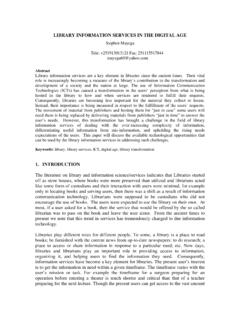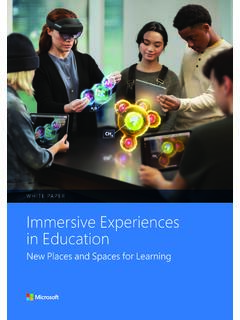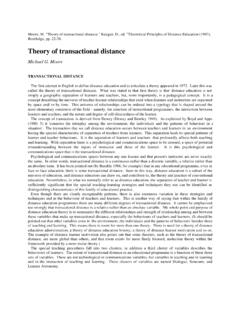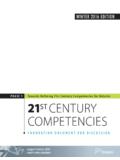Transcription of Effect of m-learning on students’ academic performance ...
1 Knowledge Management & E- learning , , Jun 2019 Effect of m- learning on students academic performance mediated by facilitation discourse and flexibility Aleema Shuja The University of Lahore, Pakistan Ijaz A. Qureshi University of Sialkot, Pakistan Donna M. Schaeffer University of Marymount, Virginia, USA Memoona Zareen University of Management and Technology, Pakistan Knowledge Management & E- learning : An International Journal (KM&EL) ISSN 2073-7904 Recommended citation: Shuja, A., Qureshi, I. A., Schaeffer, D. M., & Zareen, M. (2019). Effect of m- learning on students academic performance mediated by facilitation discourse and flexibility.
2 Knowledge Management & E- learning , 11(2), 158 200. Knowledge Management & E- learning , 11(2), 158 200 Effect of m- learning on students academic performance mediated by facilitation discourse and flexibility Aleema Shuja* Lahore Business School The University of Lahore, Pakistan E-mail: Ijaz A. Qureshi Vice Chancellor University of Sialkot, Pakistan E-mail: Donna M. Schaeffer Business and Information Systems University of Marymount, Virginia, USA E-mail: Memoona Zareen Secretary, Association of Management Development Institutions in Pakistan (AMDIP) University of Management and Technology, Pakistan E-mail: *Corresponding author Abstract: Conventional classroom instruction had already been transformed in to electronic mode of teaching and learning .
3 Use of mobile technology is evolving in global and local context, as in Pakistan. Gaining insights from Media Richness Theory, the study intends to examine how m- learning pedagogy, opens up avenues for students learning and enhances their educational performance , endorsed by facilitation discourse and flexibility. In this cross-sectional study, data was collected from students in Private Universities in Lahore Pakistan. Drawing results from structural equation modelling, findings revealed that use of mobile devices is on great demand for providing flexible and discussion-oriented learning to students and lifts up their academic output.
4 Facilitation discourse and flexibility play a robust intervening role in producing pronounced impact of m- learning on learners effectiveness. Keywords: Mobile- learning ; Facilitation discourse; Flexibility; Students academic performance ; Media richness theory Biographical notes: Aleema Shuja is a Permanent Lecturer in Lahore Business School (LBS) at The University of Lahore, Pakistan. She completed Masters of Science in Management Sciences MS (MS) from COMSATS Institute of Knowledge Management & E- learning , 11(2), 158 200 159 Information Technology, Lahore. Her areas of research include M- learning , Organizational Resilience, Change Management, Leadership and Knowledge Management.
5 The work carried out by her in areas of responsibility and research includes: delivering lectures, seminars and tutorials; developing and implementing new methods of teaching to reflect changes in research; designing, undertaking personal research projects and actively contributing to the institution's research profile; representing the institution at professional conferences (IFKAD 2017 and 2018) and seminars, and contributing to these as necessary. More details can be found out from faculty profile on official website of The University of Lahore, can be accessed at: Prof. Dr. Ijaz A. Qureshi is the Vice Chancellor in University of Sialkot, Pakistan.
6 He obtained his Doctorate in MIS from Argosy University USA in 2006. He has been member of Academy of Management since 2015 and member of IEEE since 2014. Ijaz enjoys his participation in the innovative academic activities in Pakistan and abroad. He is in the Editorial Board of Journal of Knowledge Management and E- learning and in the Editorial Board of IISTE. His research is primarily focused on M- learning , E- learning that enables students in the developing nations to benefit from the technology to get state of the art learning opportunities in their own environment. Ijaz has used M- learning technologies to invite foreign guests in his classes in Pakistan and he regularly delivers lectures abroad.
7 Prof. Dr. Donna Schaeffer is the Professor of Business and Information Systems in University of Marymount, Virginia, USA. She has taught technology, leadership, and ethics courses at universities in the United States, Germany, and Korea. Over the course of her academic career, she has received outstanding teaching awards three times and has published more than 50 articles and book chapters. Memoona Zareen is the Secretary of Association of Management Development Institutions in Pakistan (AMDIP) at University of Management and Technology, Lahore, Pakistan. She did her MPhil Business Administration from Superior University, Lahore Pakistan in 2013 and in 2010 completed Master of Business and IT from Punjab University Lahore.
8 1. Introduction Education and learning are thought to be most crucial foundations of a growing economy, yet the academic system needs radical transformations and major technological reforms. Mobile learning , a more pronounced form of e- learning , is emerging as a stepping stone towards bringing revolution to the educational sector and providing hands on solutions to the pertaining problems (West, 2013). In contemporary education management, students tend to greatly rely upon mobile technologies to achieve dramatic performance outcomes. With intense inclination towards cellular connectivity, mobile technology is playing critical role in improving learning of the students as well as instructors.
9 Digitized technology has put way forward to enable access to information and delivery of latest learning content regardless of student s availability (Jacobs, 2013). One of the remarkable consequences of m- learning is that it engages, empowers and supports learning in such a manner that radically transforms knowledge seeking mechanism for students (West, 2012). 160 A. Shuja et al. (2019) After the advent of internet technology, the next technological revolution was development of wireless mobiles, smartphones, tablets and handhelds that are ubiquitous, reasonable, and flexible (Higgins, Xiao, & Katsipataki, 2012).
10 Mobile technology has been widely accepted by students not merely for social networking but also for the sake of making education more customized as per their learning needs. The reason for quick acceptance of learning through mobile devices is that wireless media rich practices endure higher engagement and collaboration among instructors and students. Students become proficient in harnessing internet and mobile platforms for educational purposes and boosting learning (Lai, Chang, Li, Fan, & Wu, 2013). The rising trend of adopting mobile phones for learning purposes can be observed in developing nations such as Pakistan.















